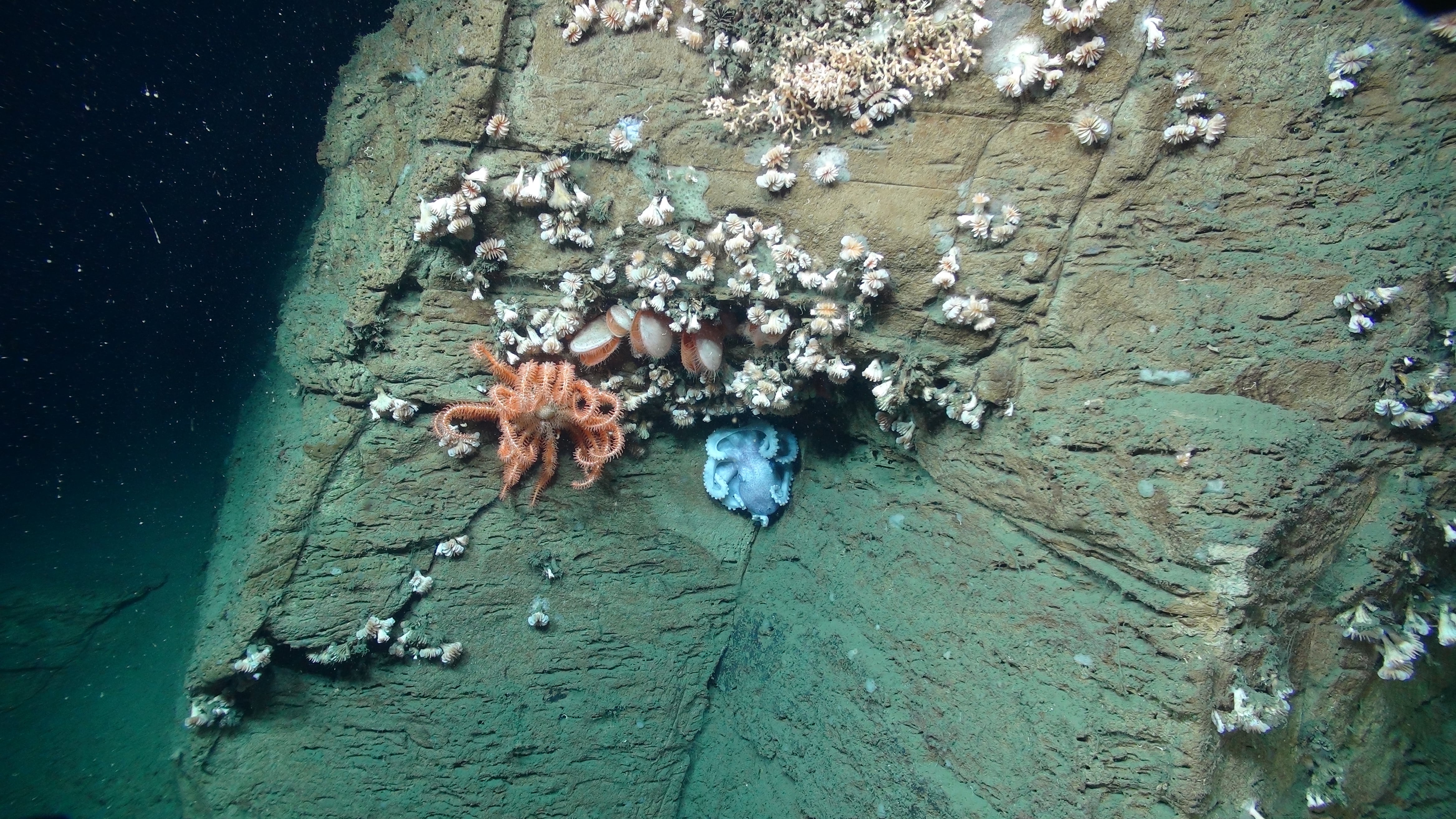- Download press statement as a PDF.
- Media Resources: Including map-based data and open source imagery
WILMINGTON, DELAWARE ― On April 7, the Mid-Atlantic Regional Council on the Ocean (MARCO), a partnership among New York, New Jersey, Delaware, Maryland and Virginia, hosted a workshop for a group of leading scientists and federal agency managers to discuss the state of current science for the deepsea canyons ecosystem and existing management programs that have jurisdiction over current and potential uses related to these canyons.
These undersea canyons mark the outer margin of the U.S. continental shelf along the entire Mid-Atlantic – a system of veritable “Grand Canyons” of the Atlantic – providing important habitat for ocean life and supporting an essential part of the economy. They are home to a wealth of unique and newly discovered marine species, including colorful cold-water corals, unique fishes, chemosynthetic mussels and many other organisms.
“We have come very far in just 15 years in what we know about the canyons. Collaboration and relationships have been critical for that”, said Dr. John McDonough, Deputy Director of the National Oceanic and Atmospheric Administration Office of Ocean Exploration and Research, which has been responsible for leading expeditions that expand our understanding of Mid-Atlantic deepsea habitats.
MARCO hosted the meeting as part of its work to enhance the vitality of the region’s ocean ecosystem and economy.
“The canyons off this coast are an important economic resource for our region. The fish, sea turtles, dolphins, whales, seabirds and other wildlife that depend on them are critical to our fishing and tourism industries. We need to ensure we have the best available science and understand what that science is telling us in order to manage them in a sustainable way”, said Sarah W. Cooksey, Environmental Program Administrator for the Delaware Coastal Programs, who sits on MARCO’s Management Board.
The meeting participants, including representatives from federal and state government, the Mid-Atlantic Fishery Management Council and academic scientists, concluded that on-going science and management efforts on Mid-Atlantic submarine canyons should emphasize:
- Research that helps us understand how important ecological communities found within submarine canyons interact with each other (from canyon to canyon) and with surrounding Mid-Atlantic habitats.
- Data sharing and collaboration tools and processes.
- Outreach, especially the development of narratives that emphasize the importance of Mid-Atlantic canyons with the public through media, aquaria and digital platforms.
- Solutions to address new effects on the canyons and corals such as marine pollution (e.g. toxics, plastics and lost fishing gear), and climate change (e.g. warming sea temperatures and increasing acidification).
“The Governors of the MARCO states agreed that these canyons are a shared regional priority due to their ecological value. Although many factors led to the fortuitous series of Mid-Atlantic canyon explorations funded by NOAA and the Bureau of Ocean Energy Management from 2011-2016 discussed at this workshop, MARCO’s identification of the need helped to galvanize the effort. We are now beginning to build a truly regional approach to maintaining the health of the canyons – a sustained collaborative effort among academic leaders, federal and state resource managers and stakeholders”, said Laura McKay, Program Manager for Virginia’s Coastal Zone Management Program and Chair of the MARCO Management Board.
Convening a regional dialogue to link scientific information to the management context was in line with MARCO’s 2014 Course of Action for the Conservation of Mid-Atlantic Submarine Canyons, which called upon the states to gather, analyze and apply the best available science on canyons, as well as to identify research gaps and consider management mechanisms.
During the canyons workshop, MARCO recognized the MAFMC and the commercial fishing community for their collaborative efforts seeking protection for the region’s deepsea corals. In 2015, the Mid-Atlantic Fishery Management Council (MAFMC) passed an amendment recommending the protection of deepsea corals from the impacts of fishing gear in the Mid-Atlantic. The amendment calls for the establishment of 38,000 square miles of “deep sea coral protection zones”.

